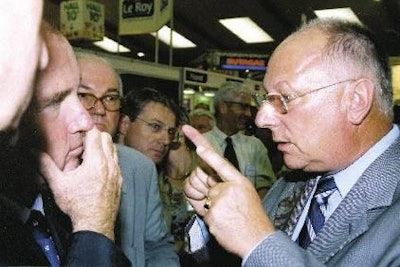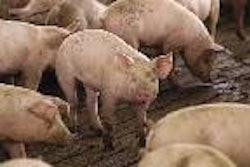
SPACE, the French farm livestock show at Rennes, Brittany, can always be relied upon to attract a top government minister. In recent years, they have hosted the President, Jacques Chirac, and the Prime Minister Dominique de Villepin. At this year’s event, it was Minister of Agriculture, Dominique Bussereau, who came face to face with a poultrymeat industry anxious, angry and still reeling from the aftershock of the avian influenza (AI) crisis.
An industry under pressure
As he made his way through the two poultry halls, the Minister was left in no doubt as to the damage caused by the 30% fall in poultry consumption and the five months that poultrymeat from France was shut out of world export markets.
As the president of the show, Jean-Michel Lemetayer, told him, “The crisis is not over. Far from it! We still see bankruptcies and judicial liquidations.” All France was suffering from the one AI outbreak at Ain, east of Lyon in February, but none more so than his home region. In the first five months of the year, poultry incomes fell 14% throughout France and 20% in Brittany.
Fears that in view of the economic situation, major egg and poultrymeat companies might stay away proved unfounded with just LDC, the label rouge giants, and Le Gouessant deciding not to come. LDC felt that their presence at SPACE would give the impression that all was well with the poultrymeat industry when clearly it was not. The group also pulled out of SIAL, the international food show in Paris in October.
Hatchery chief, Frederick Haffner, of Les Couvees des France-Sicamen was so angry with the government and the media that he left his stand empty by way of protest even though it was booked and paid for. He left just a video of his hatchery operations in the Loire Valley and the Vendee regions and a notice explaining, “We will be absent this year!”
His protest centred on the absence of any assurances about compensation and the media’s lurid headlines and wild talk of pandemics causing thousands of deaths. “Reactions to this type of communications penalise farmers, those that work in hatcheries, feed mills and threaten the security of the entire poultry sector,” he said.
At his four hatcheries in the Loire Valley and the Vendee, Mr Haffner said his company had had to destroy 2.5 million hatching eggs, parent and commercial day-olds, as well as 200,000 just-hatched poults and 100,000 chicks at a combined cost of €1 million, he said. Total workforce is 300 and a network of 150 flock farmers maintains the supply of hatching eggs.
Jean-Paul Sels, British United Turkeys manager in France, estimated the national turkey flock had shrunk by 45% and that it would take France more than five years to get back to where it was before the crisis on the export front.
Some put on a brave face
Charles Doux, whose stand was busy with the families that grow his chickens and turkeys, had made it clear that he was not going to allow the crisis to interrupt the Doux development plan. He still had the support of the banks and new products were still being added. Among the further processed lines was ‘Small Grill Room’ turkey breast meat in a range of sauces and purees and ‘Restaurant range’ chicken marinated on kebab-style skewers. Despite the confident air, published details of the group’s turnover indicated that a fall was to be expected from €1389m in 2005 to €1250m in 2006.
Across the aisle from the Doux stand, Hubbard were reporting how the AI crisis had not been allowed to knock off course the takeover of their breeding company by Groupe Grimaud, the family company that specialises in ducks, geese and rabbits. “It has accelerated events certainly and we have had to cram four years work into one, but it has worked,” said Hubbard managing director, Stephane Duthsit, operating with the president, Frederick Grimaud.
In the 12 months since the deal was signed with Merial, the previous owners, Hubbard’s headquarters in France has moved from Lyon in the east to St Brieuc, Brittany. A total of 170 jobs were lost at Hubbard.
Strong foreign interest at SPACE
A total of more than 107,000 visitors attended SPACE over the four days, confirming for the organisers that it was the foremost livestock-only show world-wide. Overseas attendance was up to 8700, boosted by the difficulty of visitors to obtain US entry visas for the Atlanta poultry show in January.
Firm links have been forged with Iran over the past 10 years. This year, there was an 80-strong delegation to study meat production. “About 50 years ago, we had to import meat. Now we are self-sufficient and even starting to export poultrymeat,” said one of the leaders of the party.
One in four jobs go at Tilly-Sabco
Fifty years ago, the broiler giant Tilly pioneered the export of frozen, oven-ready chicken to the Middle East and North Africa. Now, as Tilly-Sabco and a member of the Unicopa group, it has been forced into voluntary administration by the export ban which has reduced output production by 60% and turnover by 55% in five months since the AI outbreak. There is also 4500 tonnes of export chicken steadily losing value in cold store.
Before the crisis, the processing complex at Guerlesquin was killing 300,000 chickens each day. It is now down to 170,000 and redundancy notices have been handed out to 125 workers, including 45 salaries, and equal to at least 25% of the total workforce of some 400. These measures will be given six months to see how they work and no further moves are expected until the new year. Meantime all efforts are being made to find jobs elsewhere in the group for the redundant workers.
Avian ‘flu – a further blow
The Confederation Francaise de l’Aviculture (CFA) has put the loss to the industry at over €200 million and rising, putting at risk up to 10,000 jobs out of the 60,000 in the industry. In 2005, the federation points out, French production fell below the two million tonne barrier, with one-third exported. The peak was in 1998 at total production of 2.32m tonnes.
“Avian ‘flu is a further blow to an industry already weakened in recent years by a levelling out in consumption, aggravated by massive imports from third countries, mainly as a result of the Marrakech agreements on the World Trade Organisation and the circumvention of certain regulations,” said the CFA. In Brittany, the number of poultrymeat farms fell from 4248 in 1998 to 3072 in 2004
— Mike Parker, Horncastle, UK

















